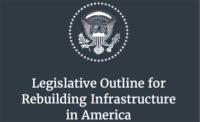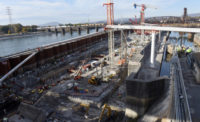In his first State of the Union address, President Trump has asked Congress to produce new infrastructure legislation to provide “at least $1.5 trillion” in total investment plus a cut in federal project permitting time to two years or less.
In his speech to a joint session of Congress on Jan. 30, Trump said that “it is time to rebuild our crumbling infrastructure.” He added, “We will build gleaming new roads, bridges, highways, railways and waterways all across our land.” [See White House transcript of speech.]
Industry officials welcomed Trump’s pro-infrastructure comments, which were one of the focal areas of his speech, but they found his remarks short on specifics and wanting in key areas, including where the federal share would come from.
Getting the proposal through Congress almost surely will require significant support from Democrats. But in one negative signal, a leading House lawmaker slammed Trump’s infrastructure remarks as a "nothing burger."
In terms that were familiar to transportation, construction and engineering groups that have tracked administration infrastructure comments for a year or more, the president said the plan would use federal dollars to attract nonfederal government funds and, “where appropriate,” private-sector financing, to hit the $1.5-trillion goal.
Trump didn’t say how much the plan’s direct federal funding would be, though other administration officials have been using a figure of $200 billion or more.
Trump also didn’t discuss what funding sources the administration would tap to produce the federal share.
American Council of Engineering Companies CEO David A. Raymond said, “The president’s focus on infrastructure is commendable, but without real federal funding to address the huge backlog of desperately needed improvements to the nation’s roads, bridges, public transit, airports, water systems and other critical assets, it’s an empty promise.”
American Public Transportation Association President and CEO Paul Skoutelas expressed concerns about news reports that the administration was mulling cuts in transit funding to pay for other parts of the infrastructure plan.
Skoutelas said in a statement, “That action would be a step backwards and counterproductive, as well as harmful to the economy and to the tens of millions of people who depend on public transportation.”
Highway Trust Fund Problem
Trump also didn’t mention the Highway Trust Fund’s long-standing revenue needs, which groups like the American Road & Transportation Builders Association (ARTBA) and American Association of State Highway and Transportation Officials underscored as a critical issue.
In recent years, Congress has kept the trust fund out of falling into a deficit by transferring more than $140 billion from the general fund.
‘The ball is in Capitol Hill’s court,” American Road & Transportation Builders Association CEO Pete Ruane said in a statement.
He added, “If scientists can clone monkeys Congress ought to be able to figure out how to raise federal dollars to fix the Highway Trust Fund and modernize our choking national freight network.”
Kristina Swallow, American Society of Civil Engineers president, said in a statement that besides fixing the trust fund, the envisioned infrastructure bill should ensure that projects it funds are “built sustainably and resiliently to maximize investment.” Swallow also said that the measure should use “existing federal programs’ selection process as a starting place.”
Associated General Contractors of America CEO Stephen Sandherr praised Trump’s pitch for more infrastructure investment but also his desire to shorten project approval times.
Sandherr said, “Finding a way to make decisions in months, instead of years—while still holding projects to a high standard for approval—will save taxpayers billions, restore public confidence in our ability to invest wisely and continue to protect the environment.”
Trump asked for bipartisan action on his plan, but the House Transportation and Infrastructure Committee’s top Democrat, Peter DeFazio (Ore.), blasted the speech as “a nothing burger, providing only generic talking points without any specific details about how he plans to address our infrastructure crisis.”
While Trump was delivering his speech, the White House did release a fact sheet that filled in some of the details. It said that the $1.5 trillion would cover a 10-year period.
It also said half of the still-unspecified federal contribution “would go towards incentivizing new state and local investments in infrastructure.”
The document also said another 25% of the federal dollars “will be dedicated to addressing rural infrastructure needs prioritized by state and local leaders.”






Post a comment to this article
Report Abusive Comment